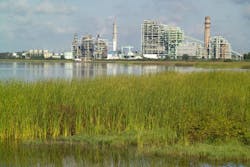Florida Power Station Saves $12 Million in 2015 Fuel Costs
Lakeland Electric, the third-largest public power utility in Florida, announced it saved $12 million in fiscal year 2015—representing 15 to 20% of its annual coal supply costs—and improved the efficiency of its McIntosh Power Generating Station Unit #3 by using GE’s FuelSolv coal treatment technology for the last several years. FuelSolv is a portfolio of specialty chemical additives that minimize combustion challenges and allow utilities to burn lower-grade, lower-cost “opportunity coal” without jeopardizing boiler efficiency. As a result, Lakeland also saved an additional $500,000 in the unit’s operating costs from 2010 to 2014.
A typical coal-burning power plant will spend approximately 70% of its operating budget on fuel. With coal prices rising in recent years, Lakeland Electric, in order to stay competitive, began looking to fuel its power plant with different types of less expensive, lower-grade opportunity coal. However, such lower-grade coal also is more difficult to burn, and using it may cause plants to experience an increase in ash slag deposits on boiler walls and super heater and re-heater tubes. These deposits reduce efficiency and increase operating costs due to tube failures, decreased heat transfer and increased maintenance costs.
To overcome this deposit problem, increase efficiency and reduce costs at its McIntosh station, Lakeland Electric enlisted GE’s FuelSolv fuel treatment program for deposit control. The chemical additives reduce slagging, which allows the plant to operate at maximum loads while minimizing the need to shut down for cleaning. Deposits that do form in the combustion zone are generally much easier to remove, reducing the downtime required for mechanical cleaning.
“Using GE’s FuelSolv application has allowed our McIntosh station to burn the lower-cost opportunity coal without the problems of slagging or de-rating in our boilers, which ultimately is saving our plant and the city of Lakeland a lot of money in operational costs and coal supply costs,” said Ken Riddle, supervisor of chemical processes for Lakeland Electric. “We have been increasing the percentage of opportunity coal used in our boilers for quite some time and were able to reach the point where 100% of fuel burned in Unit #3 is opportunity coal.”
Lakeland Electric’s deployment of FuelSolv comes at a time when coal power plants are facing increasingly stiff competition from low natural gas prices.
“With electric utilities in Florida dealing with a range of challenges, Lakeland Electric’s use of GE’s FuelSolv fuel treatment program is a great showcase for other utilities looking to increase the fuel flexibility, efficiency and competitiveness of their existing coal-fired generating units,” said Amy Ericson, chemical and monitoring solutions global leader—water and process technologies for GE Power.
For many years, McIntosh had burned Eastern bituminous Central Appalachian (CAPP) coal. However, while prices for CAPP coal increased due to various factors, natural gas prices decreased. This cost difference has placed coal-fired electric generation at a competitive disadvantage with natural gas-fired combined-cycle units.
The lowest-cost producers in the power pool run baseload, while the more expensive dispatch are idle until peak demand brings them online. To remain competitive, utilities have been seeking options to use lower-quality opportunity coals such as Northern Appalachian (NAPP) and Illinois Basin (ILB) coal as blends with or replacements for CAPP coal.
GE awarded Lakeland Electric’s McIntosh Power Generating Station with a Proof Not Promises award for its successful move to 100% opportunity coal for the period of May 2013 to March 2014. Unit #3 was offline for standard mechanical cleaning from March to October 2014, but the unit has stayed online in 2015 and has continued to burn up to 100% opportunity coal for continued fuel savings and efficient production.
“GE is always paying attention to operator needs, and we recognize those requirements fluctuate due to evolving industry regulations and environmental factors,” said Ericson. “Lakeland Electric made the right decision to use our FuelSolv additive to enhance the operations of the McIntosh facility and, in turn, benefit the city of Lakeland, as savings in fuel costs can be passed on to customers.”
GE presented the Proof Not Promises award to Ken Riddle and Linda Miller of the city of Lakeland at a small ceremony. The GE Proof Not Promises award recognizes customers for significantly improving industrial operational performance.
Source: GE Power
